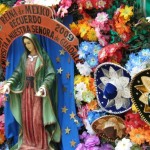In the classic Mexican song of the holy day, La Guadalupana, there is a verse that sounds nationalistic—and there is a disturbing Mexican nationalism to this holiday—but is actually very different. The verse goes:
Suplicante juntaba sus manos, Suplicante juntaba sus manos. ¡Y eran Mexicanos! ¡Y eran Mexicanos! Y eran Mexicanos su cuerpo y su faz.
(Translation: Supplicating she held her hands, Supplicating she held her hands. And they were Mexican! And they were Mexican! And her body and face were Mexican.)It literally repeats “And they were Mexican!” which is to say, “Mary was Mexican-looking!” The song sounds surprising even today. Mary came and visited this indigenous peasant, Juan Diego— news in itself—and was Mexican-looking! What a surprise! Who would have thought? Mexican- looking people getting celestial, preferential treatment!
These are the politics of Guadalupe: It is a holy day for Mexican-looking people. And there are so many Mexican-looking people who are not Mexican (and, of course, so many of them who are). Anyone who is oppressed by the look of their hands, face and body, can look with devotion to that dark-skinned Virgin and find hope. And this hope is not simply for the soul, it is for the body and the mind and the politics of the day.
For the rest: To be Catholic and still look down on an immigrant, a migrant worker, or pay any person unfair wages and alike is to be blind to the political challenge of Our Lady of Guadalupe. This may be why I have been told by non-Mexican-looking friends that this day makes them feel uncomfortable. The politics of Guadalupe is also why Fr. Sam seemed to have such a profound ability to see the plight of others and simply act: because he too was Mexican-looking— an Arab from Missouri.
We cannot all be Mexican-looking, but we can all become Mexican at heart. Some of the most Mexican-at-heart people I know have been of European, Asian, and African descent. There are too many Mexicans who merely look Mexican, but have forgotten the politics of Guadalupe in their own treatment of others, and even, perhaps, themselves.
The politics of Guadalupe are still needed today. Not only in the world at large: in our parishes and our homes too. Far too many Catholics harbor racial preference for who they see as “their own kind” in the privacy of their home, yet pretend to be together at Sunday Mass. Far too many Catholics will give their hand during the sign of peace to a dark-skinned hand but would never offer their daughter’s hand to that same person in marriage. It is an odd feeling to be at Mass as “equals in the Lord” knowing that the Eucharistic minister or lector will not allow you to date or marry their daughter because you are Mexican-looking. Far too many Catholics divide their faith into a perverse form of racial and national pride. Mexicans should never attach that despicable saying “La Raza” (“The Race”) to Our Lady. And the list goes on and on for so many of us.
On this day of Our Lady of Guadalupe, rather than become superstitiously enamored with ourselves and own kind, we should try to find the most overlooked and ignored people we live among and appear to them as Mary did to Juan Diego—and as Gabriel did to Mary and as Jesus does to Mankind. The Dark-skinned Virgin should be a deep symbol for all Catholics that shows the preference for the poor, the weak, the oppressed and the suffering in the heart of Our Mother and her Son. But we cannot merely “appear”: we must appear in a flesh not unlike their own.
In an appropriate way for this season of Advent, the politics of Guadalupe are a preparation for the politics of the Incarnation.
This piece is taken from Sam Rocha’s book of essays, Things and Stuff.
Sam Rocha is Assistant Professor of Philosophy of Education at the University of British Columbia. He is author of A Primer for the Philosophy and Education and the recently released Folk Phenomenology. He is also an accomplished musician who has two albums, Freedom for Love and Late to Love, under his belt. His upcoming third album will not have the noun “love” in the title, but will instead utilize a verbal form of the word.












